_五四_时期的安徒生童话翻译
- 格式:pdf
- 大小:187.19 KB
- 文档页数:5
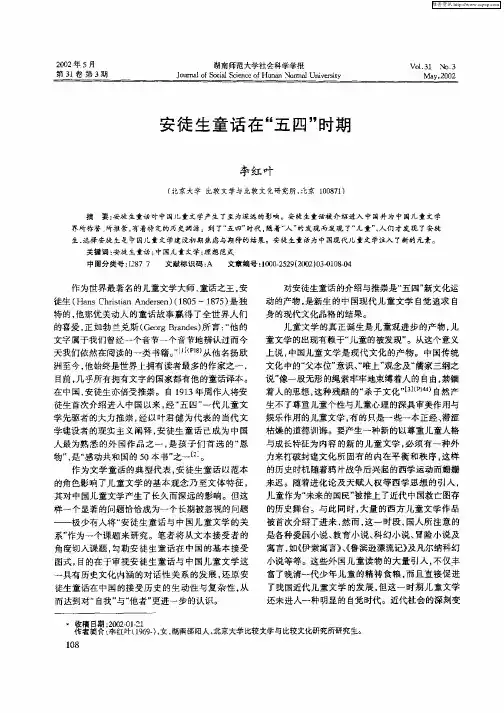
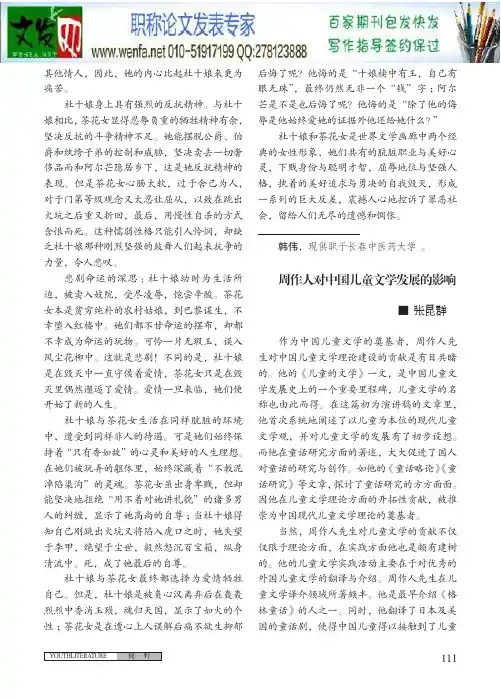
法郎的巨额花费,她仍然不得不强装欢笑接待其他情人,因此,她的内心比起杜十娘来更为痛苦。
杜十娘身上具有强烈的反抗精神。
与杜十娘相比,茶花女显得忍辱负重的牺牲精神有余,坚决反抗的斗争精神不足。
她能摆脱公爵、伯爵和纨绔子弟的控制和威胁,坚决卖去一切奢侈品而和阿尔芒隐居乡下,这是她反抗精神的表现。
但是茶花女心肠太软,过于舍己为人,对于门第等级观念又太忍让屈从,以致在跳出火坑之后重又折回,最后,用慢性自杀的方式含恨而死。
这种懦弱性格只能引人怜悯,却缺乏杜十娘那种刚烈坚强的鼓舞人们起来抗争的力量,令人悲叹。
悲剧命运的深思:杜十娘幼时为生活所迫,被卖入妓院,受尽凌辱,饱尝辛酸。
茶花女本是贫穷纯朴的农村姑娘,到巴黎谋生,不幸堕入红楼中。
她们都不甘命运的摆布,却都不幸成为命运的玩物。
可怜一片无瑕玉,误入风尘花柳中。
这就是悲剧!不同的是,杜十娘是在毁灭中一直守侯着爱情,茶花女只是在毁灭里偶然邂逅了爱情。
爱情一旦来临,她们便开始了新的人生。
杜十娘与茶花女生活在同样肮脏的环境中,遭受到同样非人的待遇。
可是她们始终保持着“只有香如故”的心灵和美好的人生理想。
在她们被玩弄的躯体里,始终深藏着“不教泥淖陷渠沟”的灵魂。
茶花女虽出身卑贱,但却能坚决地拒绝“用不着对她讲礼貌”的诸多男人的纠缠,显示了她高尚的自尊;当杜十娘得知自己刚跳出火坑又将陷入虎口之时,她失望于李甲,绝望于尘世,毅然怒沉百宝箱,纵身清流中。
死,成了她最后的自尊。
杜十娘与茶花女最终都选择为爱情牺牲自己。
但是,杜十娘是被负心汉离弃后在轰轰烈烈中香消玉殒,魂归天国,显示了如火的个性;茶花女是在遭心上人误解后痛不欲生抑郁而终,表现了她情柔似水的品性。
李甲是不是后悔了呢?他悔的是“十娘椟中有玉,自己有眼无珠”,最终仍然无非一个“钱”字;阿尔芒是不是也后悔了呢?他悔的是“除了他的侮辱是他始终爱她的证据外他还给她什么?”杜十娘和茶花女是世界文学画廊中两个经典的女性形象,她们共有的肮脏职业与美好心灵,下贱身份与聪明才智,屈辱地位与坚强人格,执着的美好追求与勇决的自我毁灭,形成一系列的巨大反差,震撼人心地控诉了罪恶社会,留给人们无尽的遗憾和惆怅。
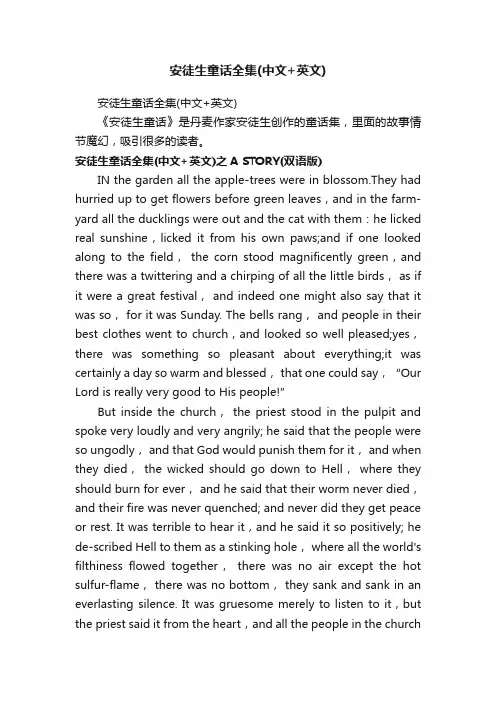
安徒生童话全集(中文+英文)安徒生童话全集(中文+英文)《安徒生童话》是丹麦作家安徒生创作的童话集,里面的故事情节魔幻,吸引很多的读者。
安徒生童话全集(中文+英文)之A STORY(双语版)IN the garden all the apple-trees were in blossom.They had hurried up to get flowers before green leaves,and in the farm-yard all the ducklings were out and the cat with them:he licked real sunshine,licked it from his own paws;and if one looked along to the field,the corn stood magnificently green,and there was a twittering and a chirping of all the little birds, as if it were a great festival, and indeed one might also say that it was so, for it was Sunday. The bells rang, and people in their best clothes went to church,and looked so well pleased;yes,there was something so pleasant about everything;it was certainly a day so warm and blessed, that one could say,“Our Lord is really very good to His people!”But inside the church,the priest stood in the pulpit and spoke very loudly and very angrily; he said that the people were so ungodly, and that God would punish them for it, and when they died,the wicked should go down to Hell,where they should burn for ever, and he said that their worm never died,and their fire was never quenched; and never did they get peace or rest. It was terrible to hear it,and he said it so positively; he de-scribed Hell to them as a stinking hole, where all the world's filthiness flowed together,there was no air except the hot sulfur-flame, there was no bottom, they sank and sank in an everlasting silence. It was gruesome merely to listen to it,but the priest said it from the heart,and all the people in the churchwere quite terrified.But outside all the little birds sang so happily,and the sun shone so warmly, it seemed as if every little flower said,“God is so v ery good to all of us.”Yes, outside it was certainly not as the preacher had said.In the evening towards bedtime, the clergyman saw his wife sitting silent and thoughtful.“What ails yon?”he said to her.“What ails me?”said she,“I cannot collect my though ts properly, I cannot get clearly into my head what you said, that there were so many ungodly, and that they should burn for ever; for ever, O, how long!I am only a sinful woman,but I could not bear to let even the worst sinner burn for ever;how then should our Lord be able to do it who is so infinitely good,and who knows how the evil comes both from without and from within? No, I cannot think it,even although you say it.”It was autumn, the leaves fell from the trees;the severe,earnest priest sat by the death-bed of his wife.“If any one should get peace in the grave and mercy from God,it is you!” said the priest, and he folded her hands and read a psalm over her body.And she was carried to her grave;two heavy tears rolled down over the cheeks of the earnest priest; and in his house it was quiet and lonely, the sunshine was extinguished; she had gone away.It was night;a cold wind blew over the head of the priest,he opened his eyes,and it seemed as if the moon shone into his room, but the moon was not shining; it was a figure which stood before his bed; he saw the ghost of his dead wife;she looked at him sorrowfully, it seemed as if she wanted to say something.And the man raised himself half up,and stretched out hisarms to her:“Have you not been granted eternal rest either?Do you suffer—you the best,the most pious?” And the departed one bowed her head for “Yes”,and laid her hands on her breast.“And can I obtain rest for you in the grave?”“Yes,”it answered him.“And how?”“ Give me a hair, only a single hair, from the head of the sinner whose fire will never be quenched,the sinner whom God will thrust down into everlasting punishment.”“Yes, so easily can you be set free, you pure and pious soul!”“Then follow me!” said the departed.“It is so vouchsafed to us. By my side you can float whither your thoughts will;unseen by men we stand in their most secret 438corners,but with steady hand you must point to the one consecrated to everlasting pain, and before cock-crow he must be found.And quickly,as if carried by thought,they were in the great town;and from the walls of the houses shone in letters of fire the names of the deadly sins:Pride,Avarice, Drunkenness,Self-indulgence,in short, the whole seven-hued rainbow of sin.“Yes,in there, as I thought,as I knew,” said the priest,“dwell those who are destined for eternal fire.”And they stood before the gorgeously lighted portal, where the broad stair was decorated with carpets and flowers,and dance-music sounded through the festive halls.The footman stood in silk and velvet with silver-mounted stick.“Our ball can compare with that of the king,” said he,and he turned to the crowd on the street; from top to toe the thought shone out of him,“Poor pack,who stare in at theportal, you are common people compared with me,all of yon!”“Pride,” said the departed one.“Do you see him?”“Yes, but he is a simpleton, only a fool,and will not be condemned to everlasting fire and pain!”“Only a fool! sounded through the whole house of Pride; they were all “only fools”there.And they flew within the four bare walls of Avarice,where,lean,chattering with cold,hungry and thirsty,the old one clung to his gold with all his thoughts;they saw how he sprang from his miserable couch,as in a fever, and took a loose stone out of the wall,where gold-money lay in a stoking-leg;he fingered his patched coat into which gold pieces were sewn,and the moist fingers trembled.“He is ill,it is madness,a joyless madness,beset with fear and evil dreams.”And they departed in haste,and stood by the couch-Es of the criminals where they slept in long rows, side by side.Like a wild animal, one of them started up out of his sleep,uttering a horrid shriek;he dug his pointed elbow into his comrade, who turned sleepily.“Hold your tongue, you blockhead,and sleep!—it is the same every night!”“Every night,” he repeated,“yes,every night he comes and howls and suffocates me.In passion have I done one thing and another,an angry mind was I born with; it has brought me here a second time;but if I have done wrong,then I have had my punishment.Only one thing have I not acknowledged. When I last came out of here and passed my master's farm,one thing and another boiled up in me,—I scratched a sulfur match along the wall, it ran a little too nearthe thatch of the roof, everything burned.Passion came over it,as it comes over me.I helped to save the cattle and effects.Nothing living was burned but a flock of pigeons,which flew into the fire,and the watch-dog. I had not thought of it. One could hear it howling,and that howl I always hear still,when I want to sleep,and when I fall asleep, then comes the dog,so big and shaggy; he lays himself on me,howls,presses me,and suffocates me. Then listen to what I tell you; you can snore, snore the whole night, and I not a short quarter of an hour.” And the blood shone in his eyes, he threw himself over his comrade and hit him with clenched fist in the face.“Angry Ads has gone mad again!” was the cry round about,and the other scoundrels caught hold of him,wrestled with him,and bent him so that his head sat between his legs where they bound it fast;the blood was almost springing out of his eyes and all his pores.“You will kill him,”shouted the priest,“the miser-able one!” And whilst he, in order to hinder them,stretched out his hand over the sinner, who already in this world suffered too severely,the scene changed;they flew through rich halls, and through poor rooms; Self-Indus-gene,Envy,all the deadly sins marched past them;an angel of judgment read their sins,their defense;this was but weak before God,but God reads the hearts,He knows everything,the evil which comes from within and from without, He who is mercy and love. The hand of the priest trembled,he dared not stretch it forth to pull a hair from the sinner's head.And the tears streamed from his eyes,like the water of mercy and love, which quench the ever-lasting fires of Hell.And the cock crew.“Merciful God!The will give her that rest in the grave,whichI have not been able to obtain.”“I have it now!”s aid the dead one,“it was they hard words,they dark belief about God and His works,which drove me to the!Learn to know men;even in the wicked there is something of God,something which will triumph,and quench the fire of Hell.”A kiss was pressed on the mouth of the priest,light beamed round about him;God's clear sun shone into the chamber,where his wife, gentle and loving, wakened him from a dream sent by God.一个故事花园里的苹果树都开了花。
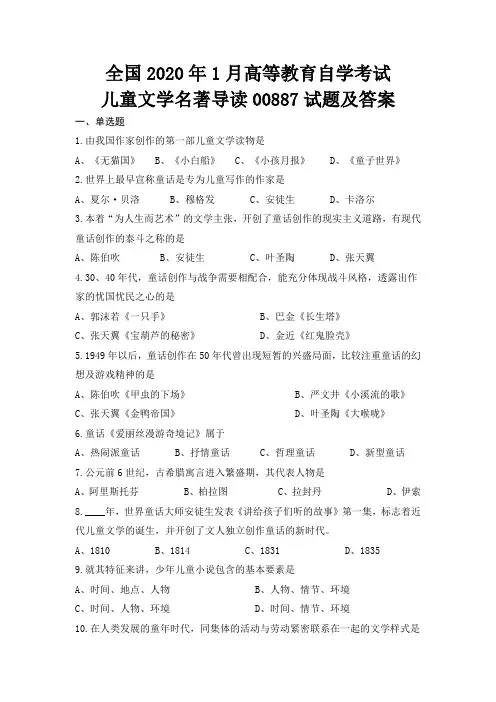
全国2020年1月高等教育自学考试儿童文学名著导读00887试题及答案一、单选题1.由我国作家创作的第一部儿童文学读物是A、《无猫国》B、《小白船》C、《小孩月报》D、《童子世界》2.世界上最早宣称童话是专为儿童写作的作家是A、夏尔·贝洛B、穆格发C、安徒生D、卡洛尔3.本着“为人生而艺术”的文学主张,开创了童话创作的现实主义道路,有现代童话创作的泰斗之称的是A、陈伯吹B、安徒生C、叶圣陶D、张天翼4.30、40年代,童话创作与战争需要相配合,能充分体现战斗风格,透露出作家的忧国忧民之心的是A、郭沫若《一只手》B、巴金《长生塔》C、张天翼《宝葫芦的秘密》D、金近《红鬼脸壳》5.1949年以后,童话创作在50年代曾出现短暂的兴盛局面,比较注重童话的幻想及游戏精神的是A、陈伯吹《甲虫的下场》B、严文井《小溪流的歌》C、张天翼《金鸭帝国》D、叶圣陶《大喉咙》6.童话《爱丽丝漫游奇境记》属于A、热闹派童话B、抒情童话C、哲理童话D、新型童话7.公元前6世纪,古希腊寓言进入繁盛期,其代表人物是A、阿里斯托芬B、柏拉图C、拉封丹D、伊索8.____年,世界童话大师安徒生发表《讲给孩子们听的故事》第一集,标志着近代儿童文学的诞生,并开创了文人独立创作童话的新时代。
A、1810B、1814C、1831D、18359.就其特征来讲,少年儿童小说包含的基本要素是A、时间、地点、人物B、人物、情节、环境C、时间、人物、环境D、时间、情节、环境10.在人类发展的童年时代,同集体的活动与劳动紧密联系在一起的文学样式是A、诗歌B、传说C、神话D、寓言11.下列作品中被认为科幻小说开山之作的是A、《月亮》B、《海底两万里》C、《探险》D、《弗兰肯斯坦》12.我国最早的一部儿歌专集是16世纪末编辑而成的A、《飞鸟集》B、《演小儿语》C、《古今歌谣》D、《广籁集》13.五四时期,受安徒生童话等西方童话的影响,一些新文学的先驱者在从事成人文学创作的同时,开始创作童话,最突出的有A、陶行知、叶圣陶B、茅盾、陶行知C、叶圣陶、茅盾D、郭沫若、巴金14.关注儿童的自由发展,把童年看做自然的人生,并试图保持儿童内在的热爱自由的天性的儿童文学属于A、爱的母题B、顽童母题C、自然母题D、成长母题15.郑文年的科幻文学创作从20世纪50年代延续到80年代初期。
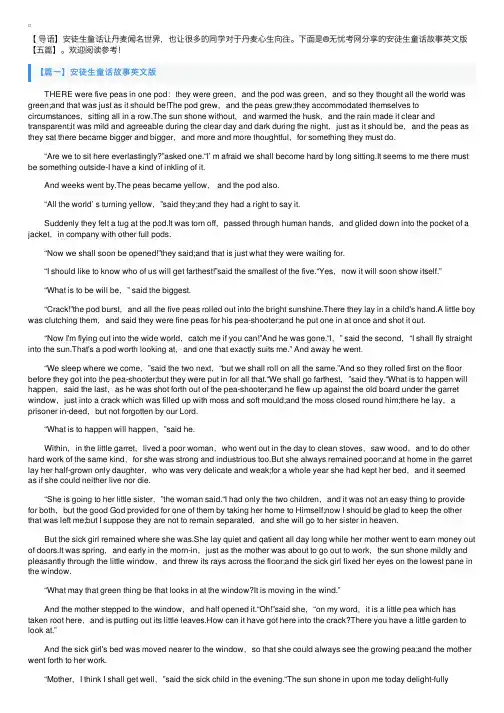
【导语】安徒⽣童话让丹麦闻名世界,也让很多的同学对于丹麦⼼⽣向往。
下⾯是®⽆忧考⽹分享的安徒⽣童话故事英⽂版【五篇】。
欢迎阅读参考!【篇⼀】安徒⽣童话故事英⽂版 THERE were five peas in one pod:they were green,and the pod was green,and so they thought all the world was green;and that was just as it should be!The pod grew,and the peas grew;they accommodated themselves to circumstances,sitting all in a row.The sun shone without,and warmed the husk,and the rain made it clear and transparent;it was mild and agreeable during the clear day and dark during the night,just as it should be,and the peas as they sat there became bigger and bigger,and more and more thoughtful,for something they must do. “Are we to sit here everlastingly?”asked one.“I’ m afraid we shall become hard by long sitting.It seems to me there must be something outside-I have a kind of inkling of it. And weeks went by.The peas became yellow, and the pod also. “All the world’ s turning yellow,”said they;and they had a right to say it. Suddenly they felt a tug at the pod.It was torn off,passed through human hands,and glided down into the pocket of a jacket,in company with other full pods. “Now we shall soon be opened!”they said;and that is just what they were waiting for. “I should like to know who of us will get farthest!”said the smallest of the five.“Yes,now it will soon show itself.” “What is to be will be,” said the biggest. “Crack!”the pod burst,and all the five peas rolled out into the bright sunshine.There they lay in a child's hand.A little boy was clutching them,and said they were fine peas for his pea-shooter;and he put one in at once and shot it out. “Now I'm flying out into the wide world,catch me if you can!”And he was gone.“I,” said the second,“I shall fly straight into the sun.That's a pod worth looking at,and one that exactly suits me.” And away he went. “We sleep where we come,”said the two next,“but we shall roll on all the same.”And so they rolled first on the floor before they got into the pea-shooter;but they were put in for all that.“We shall go farthest,”said they.“What is to happen will happen,said the last,as he was shot forth out of the pea-shooter;and he flew up against the old board under the garret window,just into a crack which was filled up with moss and soft mould;and the moss closed round him;there he lay,a prisoner in-deed,but not forgotten by our Lord. “What is to happen will happen,”said he. Within,in the little garret,lived a poor woman,who went out in the day to clean stoves,saw wood,and to do other hard work of the same kind,for she was strong and industrious too.But she always remained poor;and at home in the garret lay her half-grown only daughter,who was very delicate and weak;for a whole year she had kept her bed,and it seemed as if she could neither live nor die. “She is going to her little sister,”the woman said.“I had only the two children,and it was not an easy thing to provide for both,but the good God provided for one of them by taking her home to Himself;now I should be glad to keep the other that was left me;but I suppose they are not to remain separated,and she will go to her sister in heaven. But the sick girl remained where she was.She lay quiet and qatient all day long while her mother went to earn money out of doors.It was spring,and early in the morn-in,just as the mother was about to go out to work,the sun shone mildly and pleasantly through the little window,and threw its rays across the floor;and the sick girl fixed her eyes on the lowest pane in the window. “What may that green thing be that looks in at the window?It is moving in the wind.” And the mother stepped to the window,and half opened it.“Oh!”said she,“on my word,it is a little pea which has taken root here,and is putting out its little leaves.How can it have got here into the crack?There you have a little garden to look at.” And the sick girl's bed was moved nearer to the window,so that she could always see the growing pea;and the mother went forth to her work. “Mother,I think I shall get well,”said the sick child in the evening.“The sun shone in upon me today delight-fullywarm.The little pea is thriving famously,and I shall thrive too,and get up,and go out into the warm sun-shine. “God grant it!”said the mother,but she did not believe it would be so;but she took carec to prop with a little stick the green plant which had given her daughter the pleasant thoughts of life,so that it might not be broken by the wind;she tied a piece of string to the window-sill and to the upper part of the frame,so that the pea might have something round which it could twine,when it shot up:and it did shoot up indeed-one could see how it grew every day. “Really,here is a flower coming!”said the woman one day;and now she began to cherish the hope that her sick daughter would recover.She remembered that lately the child had spoken much more cheerfully than before,that in the last few days she had risen up in bed of her own accord,and had sat upright,looking with delighted eyes at the little garden in which only one plant grew.A week afterwards the invalid for the first time sat up for a whole hour.Quite happy,she sat there in the warm sunshine;the window was opened,and in front of it outside stood a pink pea blossom,fully blown.The sick girl bent down and gently kissed the delicate leaves.This day was like a festival.“The Heavenly Father Himself has planted that pea,and caused it to thrive,to be a joy to you,and to me also,my blessed child!”said the glad mother;and she smiled at the flower,as if it had been a good angel. But about the other peas?Why,the one who flew out into the wide world and said,“Catch me if you can,”fell into the gutter on the roof,and found a home in a pigeon's crop,and lay there like Jonah in the whale;the two lazy ones got just as far,for they,too,were eaten up by pigeons,and thus,at any rate,they were of some real use;but the fourth,who wanted to go up into the sun,fell into the gutter,and lay there in the dirty water for days and weeks,and swelled prodigiously.“How beautifully fat I'm growing!”said the Pea.“I shall burst at last;and I don't think any pea can do more than that.I'm the most remarkable of all the five that were in the pod.” And the Gutter said he was right. But the young girl at the garret window stood there with gleaming eyes,with the hue of health on her cheeks,and folded her thin hands over the pea blossom,and thanked Heaven for it. “I,” said the Gutter,“stand up for my own pea.”【篇⼆】安徒⽣童话故事英⽂版 There was once a Prince who wished to marry a Princess; but then she must be a real Princess. He travelled all over the world in hopes of finding such a lady; but there was always something wrong. Princesses he found in plenty; but whether they were real Princesses it was impossible for him to decide, for now one thing, now another, seemed to him not quite right about the ladies. At last he returned to his palace quite cast down, because he wished so much to have a real Princess for his wife. One evening a fearful tempest arose, it thundered and lightened, and the rain poured down from the sky in torrents: besides, it was as dark as pitch. All at once there was heard a violent knocking at the door, and the old King, the Prince's father, went out himself to open it. It was a Princess who was standing outside the door. What with the rain and the wind, she was in a sad condition; the water trickled down from her hair, and her clothes clung to her body. She said she was a real Princess. "Ah! we shall soon see that!" thought the old Queen-mother; however, she said not a word of what she was going to do; but went quietly into the bedroom, took all the bed-clothes off the bed, and put three little peas on the bedstead. She then laid twenty mattresses one upon another over the three peas, and put twenty feather beds over the mattresses. Upon this bed the Princess was to pass the night. The next morning she was asked how she had slept. "Oh, very badly indeed!" she replied. "I have scarcely closed my eyes the whole night through. I do not know what was in my bed, but I had something hard under me, and am all over black and blue. It has hurt me so much!" Now it was plain that the lady must be a real Princess, since she had been able to feel the three little peas through the twenty mattresses and twenty feather beds. None but a real Princess could have had such a delicate sense of feeling. The Prince accordingly made her his wife; being now convinced that he had found a real Princess. The three peas were however put into the cabinet of curiosities, where they are still to be seen, provided they are not lost. Wasn't this a lady of real delicacy?【篇三】安徒⽣童话故事英⽂版 Most terribly cold it was; it snowed, and was nearly quite dark, and evening--the last evening of the year.In this cold and darkness there went along thestreet a poor little girl,bareheaded,and with naked feet. When she left homeshe had slippers on, it is true; but what was the good of that?They were verylarge slippers,which her mother had hitherto worn;so large were they;andthe poor little thing lost them as she scuffled away across the street,because of two carriages that rolled by dreadfully fast. One slipper was nowhere to be found; the other had been laid hold of by anurchin, and off he ran with it;he thought it would do capitally for a cradlewhen he some day or other should have children himself. So the little maidenwalked on with her tiny naked feet, that were quite red and blue from cold.She carried a quantity of matches in an old apron, and she held a bundle ofthem in her hand.Nobody had bought anything of her the whole livelong day;noone had given her a single farthing. She crept along trembling with cold and hunger--a very picture of sorrow, thepoor little thing!The flakes of snow covered her long fair hair, which fell in beautiful curlsaround her neck; but of that, of course, she never once now thought. From allthe windows the candles were gleaming, and it smelt so deliciously of roastgoose, for you know it was New Year's Eve; yes, of that she thought.In a corner formed by two houses, of which one advanced more than the other,she seated herself down and cowered together. Her little feet she had drawnclose up to her, but she grew colder and colder, and to go home she did notventure, for she had not sold any matches and could not bring a farthing ofmoney:from her father she would certainly get blows, and at home it was coldtoo, for above her she had only the roof, through which the wind whistled,even though the largest cracks were stopped up with straw and rags. it was a wonderful light. It seemed really to thelittle maiden as though she were sitting before a large iron stove, withburnished brass feet and a brass ornament at top. The fire burned with suchblessed influence; it warmed so delightfully. The little girl had alreadystretched out her feet to warm them too; but--the small flame went out, thestove vanished:she had only the remains of the burnt-out match in her hand. She rubbed another against the wall:it burned brightly, and where the lightfell on the wall, there the wall became transparent like a veil, so that shecould see into the room. On the table was spread a snow-white tablecloth;uponit was a splendid porcelain service,and the roast goose was steaming famouslywith its stuffing of apple and dried plums.And what was still more capital tobehold was, the goose hopped down from the dish, reeled about on the floorwith knife and fork in its breast, till it came up to the poor little girl;when--the match went out and nothing but the thick, cold, damp wall was leftbehind. She lighted another match. Now there she was sitting under the mostmagnificent Christmas tree:it was still larger,and more decorated than theone which she had seen through the glass door in the rich merchant's house. Thousands of lights were burning on the green branches, and gaily-coloredpictures, such as she had seen in the shop-windows, looked down upon her.The little maiden stretched out her hands towards them when--the match wentout. The lights of the Christmas tree rose higher and higher,she saw them nowas stars in heaven; one fell down and formed a long trail of fire. "Someone is just dead!" said the little girl; for her old grandmother, theonly person who had lovedher, and who was now no more, had told her, thatwhen a star falls, a soul ascends to God.She drew another match against the wall:it was again light, and in the lustrethere stood the old grandmother, so bright and radiant, so mild, and with suchan expression of love. "Grandmother!" cried the little one. "Oh, take me with you! You go away whenthe match burnsout;you vanish like the warm stove,like the delicious roastgoose,and like the magnificent Christmas tree!"And she rubbed the wholebundle of matches quickly against the wall,for she wanted to be quite sure ofkeeping her grandmother near her. And the matches gave such a brilliant lightthat it was brighter than at noon-day:never formerly had the grandmother beenso beautiful and so tall. She took the little maiden, on her arm, and bothflew in brightness and in joy so high,so very high, and then above wasneither cold, nor hunger, nor anxiety--they were with God.But in the corner, at the cold hour of dawn, sat the poor girl, with rosycheeks and with a smiling mouth, leaning against the wall--frozen to death onthe last evening of the old year. Stiff and stark sat the child there with hermatches, of which one bundle had been burnt. "She wanted to warm herself,"people said. No one had the slightest suspicion of what beautiful things shehad seen; no one even dreamed of the splendor in which, with her grandmothershe had entered on the joys of a new year.【篇四】安徒⽣童话故事英⽂版 a good child dies, an angel of God comes down from heaven, takes the dead child in his arms, spreads out his great white wings, and flies with him over all the places which the child had loved during his life. Then he gathers a large handful of flowers, which he carries up to the Almighty, that they may bloom more brightly in heaven than they do on earth. And the Almighty presses the flowers to His heart, but He kisses the flower that pleases Him best, and it receives a voice, and is able to join the song of the chorus of bliss. These words were spoken by an angel of God, as he carried a dead child up to heaven, and the child listened as if in a dream. Then they passed over well-known spots, where the little one had often played, and through beautiful gardens full oflovely flowers. "Which of these shall we take with us to heaven to be transplanted there?" asked the angel. Close by grew a slender, beautiful, rose-bush, but some wicked hand had broken the stem, and the half-opened rosebuds hung faded and withered on the trailing branches. "Poor rose-bush!" said the child, "let us take it with us to heaven, that it may bloom above in God's garden." The angel took up the rose-bush; then he kissed the child, and the little one half opened his eyes. The angel gathered also some beautiful flowers, as well as a few humble buttercups and heart's-ease. "Now we have flowers enough," said the child; but the angel only nodded, he did not fly upward to heaven. It was night, and quite still in the great town. Here they remained, and the angel hovered over a small, narrow street, in which lay a large heap of straw, ashes, and sweepings from the houses of people who had removed. There lay fragments of plates, pieces of plaster, rags, old hats, and other rubbish not pleasant to see. Amidst all this confusion, the angel pointed to the pieces of a broken flower-pot, and to a lump of earth which had fallen out of it. The earth had been kept from falling to pieces by the roots of a withered field-flower, which had been thrown amongst the rubbish. "We will take this with us," said the angel, "I will tell you why as we fly along." And as they flew the angel related the history. "Down in that narrow lane, in a low cellar, lived a poor sick boy; he had been afflicted from his childhood, and even in his best days he could just manage to walk up and down the room on crutches once or twice, but no more. During some days in summer, the sunbeams would lie on the floor of the cellar for about half an hour. In this spot the poor sick boy would sit warming himself in the sunshine, and watching the red blood through his delicate fingers as he held them before his face. Then he would say he had been out, yet he knew nothing of the green forest in its spring verdure, till a neighbor's son brought him a green bough from a beech-tree. This he would place over his head, and fancy that he was in the beech-wood while the sun shone, and the birds caroled gaily. One spring day the neighbor's boy brought him some field-flowers, and among them was one to which the root still adhered. This he carefully planted in a flower-pot, and placed in a window-seat near his bed. And the flower had been planted by a fortunate hand, for it grew, put forth fresh shoots, and blossomed every year. It became a splendid flower-garden to the sick boy, and his little treasure upon earth.? He watered it, and cherished it, and took care it should have the benefit of every sunbeam that found its way into the cellar, from the earliest morning ray to the evening sunset. The flower entwined itself even in his dreams- for him it bloomed, for him spread its perfume. And it gladdened his eyes, and to the flower he turned, even in death, when the Lord called him. He has been one year with God. During that time the flower has stood in the window, withered and forgotten, till at length cast out among the sweepings into the street, on the day of the lodgers' removal. And this poor flower, withered and faded as it is, we have added to our nosegay, because it gave more real joy than the most beautiful flower in the garden of a queen." "But how do you know all this?" asked the child whom the angel was carrying to heaven. "I know it," said the angel, "because I myself was the poor sick boy who walked upon crutches, and I know my own flower well." Then the child opened his eyes and looked into the glorious happy face of the angel, and at the same moment they found themselves in that heavenly home where all is happiness and joy. And God pressed the dead child to His heart, and wings were given him so that he could fly with the angel, hand in hand? Then the Almighty pressed all the flowers to His heart; but He kissed the withered field-flower, and it received a voice. Then it joined in the song of the angels, who surrounded the throne, some near, and others in a distant circle, but all equally happy. They all joined in the chorus of praise, both great and small,- the good, happy child, and the poor field-flower, that once lay withered and cast away on a heap of rubbish in a narrow, dark street.【篇五】安徒⽣童话故事英⽂版 Once upon a time there lived a fisherman who earned a living selling fish, making his rounds to thecustomers on a horse drawn cart loaded with his catch of the day. One cold winter day, while the fisherman was crossing the woods, a fox smelled the fish and began following the cart at a close distance. The fisherman kept his trout in long wicker baskets and the sight of the fish made the fox's mouth water. The fox,however, was reluctant to jump on the cart to steal a fish because the fisherman had a long whip that he cracked from time to time to spur on the horse. But the smell of fresh fish was so enticing that the fox overcame her fear of the whip, leapt on to the cart and with a quick blow of her paw, dropped a wicker basket on the snow. The fisherman did not notice anything and continued his journey undisturbed. The fox was very happy. She opened the basket and got ready to enjoy her meal. She was about to taste the first bite when a bear appeared. "Where did you get all that marvelous trout?" the big bear asked with a hungry look on its face. "I've been fishing," the fox answered, unperturbed. "Fishing? How? The lake is frozen over," the bear said, incredulously. "How did you manage to fish?" The fox was aware that, unless she could get rid of the bear with some kind of excuse, she would have had to share her fish. But the only plausible answer she could come up with was: "I fished with my tail." "With your tail?" said the bear, who was even more astonished. "Sure, with my tail. I made a hole in the ice, I dropped my tail in the water and when I felt a bite I pulled it out and a fish was stuck on its end," the fox told the bear. The bear touched his tail and his mouth began watering. He said: "Thanks for the tip. I'm going fishing too." The lake was not too far away, but the ice was very thick and the bear had a hard time making a hole in it. Finally, his long claws got the job done. As time went by and evening approached, it got colder and colder. The bear shivered but he kept sitting by the hole with his tail in the water. No fish had bitten yet. The bear was very cold and the water of the lake began freezing again around his tail. It was then that the bear felt something like a bite on the end of his frozen tail. The bear pulled with all his strength, heard something tear and at the same time felt a very sharp pain. He turned around to find out what kind of fish he had caught, and right then he realized that his tail, trapped in the ice, had been torn off. Ever since then, bears have had a little stump instead of a long and thick tail.。
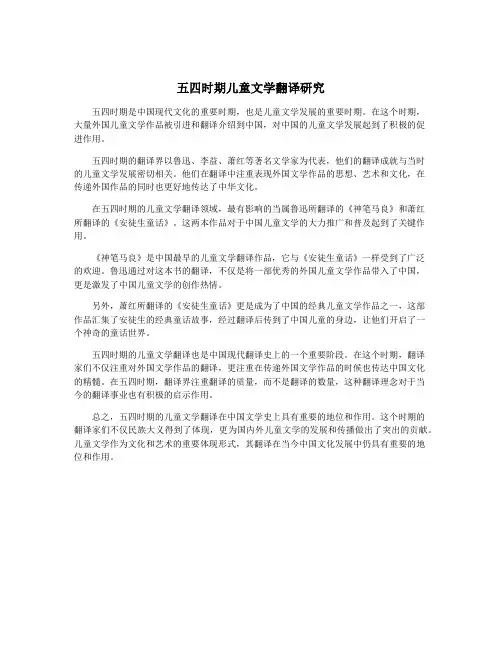
五四时期儿童文学翻译研究五四时期是中国现代文化的重要时期,也是儿童文学发展的重要时期。
在这个时期,大量外国儿童文学作品被引进和翻译介绍到中国,对中国的儿童文学发展起到了积极的促进作用。
五四时期的翻译界以鲁迅、李益、萧红等著名文学家为代表,他们的翻译成就与当时的儿童文学发展密切相关。
他们在翻译中注重表现外国文学作品的思想、艺术和文化,在传递外国作品的同时也更好地传达了中华文化。
在五四时期的儿童文学翻译领域,最有影响的当属鲁迅所翻译的《神笔马良》和萧红所翻译的《安徒生童话》。
这两本作品对于中国儿童文学的大力推广和普及起到了关键作用。
《神笔马良》是中国最早的儿童文学翻译作品,它与《安徒生童话》一样受到了广泛的欢迎。
鲁迅通过对这本书的翻译,不仅是将一部优秀的外国儿童文学作品带入了中国,更是激发了中国儿童文学的创作热情。
另外,萧红所翻译的《安徒生童话》更是成为了中国的经典儿童文学作品之一,这部作品汇集了安徒生的经典童话故事,经过翻译后传到了中国儿童的身边,让他们开启了一个神奇的童话世界。
五四时期的儿童文学翻译也是中国现代翻译史上的一个重要阶段。
在这个时期,翻译家们不仅注重对外国文学作品的翻译,更注重在传递外国文学作品的时候也传达中国文化的精髓。
在五四时期,翻译界注重翻译的质量,而不是翻译的数量,这种翻译理念对于当今的翻译事业也有积极的启示作用。
总之,五四时期的儿童文学翻译在中国文学史上具有重要的地位和作用。
这个时期的翻译家们不仅民族大义得到了体现,更为国内外儿童文学的发展和传播做出了突出的贡献。
儿童文学作为文化和艺术的重要体现形式,其翻译在当今中国文化发展中仍具有重要的地位和作用。
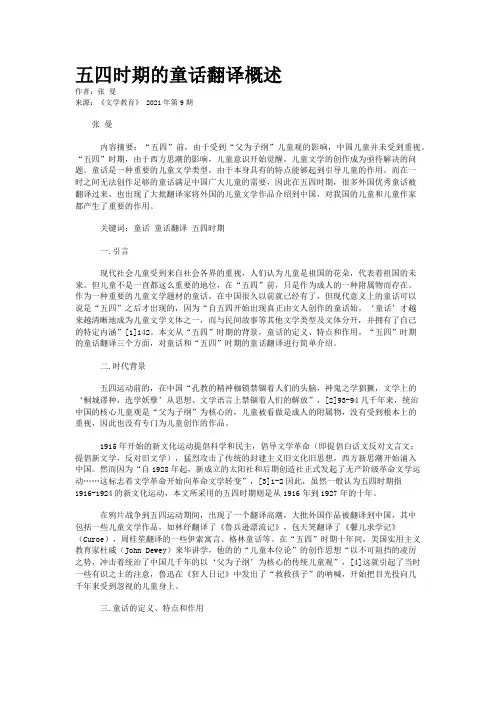
五四时期的童话翻译概述作者:张曼来源:《文学教育》 2021年第9期张曼内容摘要:“五四”前,由于受到“父为子纲”儿童观的影响,中国儿童并未受到重视。
“五四”时期,由于西方思潮的影响,儿童意识开始觉醒,儿童文学的创作成为亟待解决的问题。
童话是一种重要的儿童文学类型,由于本身具有的特点能够起到引导儿童的作用。
而在一时之间无法创作足够的童话满足中国广大儿童的需要,因此在五四时期,很多外国优秀童话被翻译过来,也出现了大批翻译家将外国的儿童文学作品介绍到中国,对我国的儿童和儿童作家都产生了重要的作用。
关键词:童话童话翻译五四时期一.引言现代社会儿童受到来自社会各界的重视,人们认为儿童是祖国的花朵,代表着祖国的未来。
但儿童不是一直都这么重要的地位,在“五四”前,只是作为成人的一种附属物而存在。
作为一种重要的儿童文学题材的童话,在中国很久以前就已经有了,但现代意义上的童话可以说是“五四”之后才出现的,因为“自五四开始出现真正由文人创作的童话始,‘童话’才越来越清晰地成为儿童文学文体之一,而与民间故事等其他文学类型及文体分开,并拥有了自己的特定内涵”[1]142。
本文从“五四”时期的背景,童话的定义、特点和作用,“五四”时期的童话翻译三个方面,对童话和“五四”时期的童话翻译进行简单介绍。
二.时代背景五四运动前的,在中国“孔教的精神枷锁禁锢着人们的头脑,神鬼之学猖獗,文学上的‘桐城谬种,选学妖孽’从思想、文学语言上禁锢着人们的解放”,[2]93-94几千年来,统治中国的核心儿童观是“父为子纲”为核心的,儿童被看做是成人的附属物,没有受到根本上的重视,因此也没有专门为儿童创作的作品。
1915年开始的新文化运动提倡科学和民主,倡导文学革命(即提倡白话文反对文言文;提倡新文学,反对旧文学),猛烈攻击了传统的封建主义旧文化旧思想,西方新思潮开始涌入中国。
然而因为“自1928年起,新成立的太阳社和后期创造社正式发起了无产阶级革命文学运动……这标志着文学革命开始向革命文学转变”,[3]1-2因此,虽然一般认为五四时期指1916-1924的新文化运动,本文所采用的五四时期则是从1916年到1927年的十年。
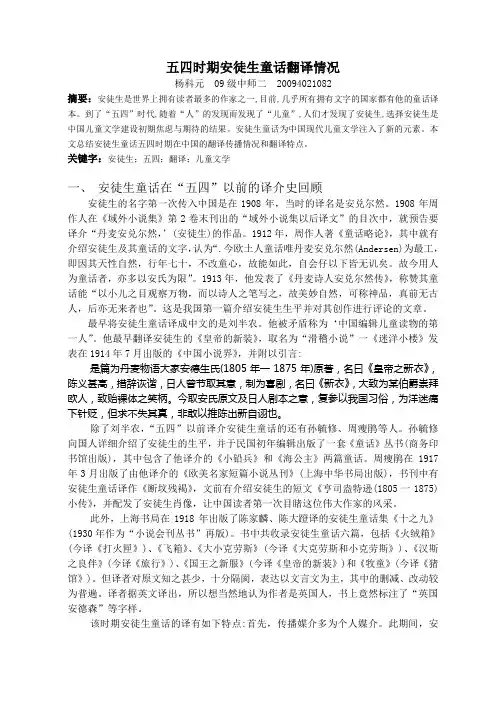
五四时期安徒生童话翻译情况杨科元 09级中师二 20094021082摘要:安徒生是世界上拥有读者最多的作家之一,目前,几乎所有拥有文字的国家都有他的童话译本。
到了“五四”时代,随着“人”的发现而发现了“儿童”,人们才发现了安徒生,选择安徒生是中国儿童文学建设初期焦虑与期待的结果。
安徒生童话为中国现代儿童文学注入了新的元素。
本文总结安徒生童话五四时期在中国的翻译传播情况和翻译特点。
关键字:安徒生;五四;翻译;儿童文学一、安徒生童话在“五四”以前的译介史回顾安徒生的名字第一次传入中国是在1908年,当时的译名是安兑尔然。
1908年周作人在《域外小说集》第2卷末刊出的“域外小说集以后译文”的目次中,就预告要译介“丹麦安兑尔然,’(安徒生)的作品。
1912年,周作人著《童话略论》,其中就有介绍安徒生及其童话的文字,认为“.今欧土人童话唯丹麦安兑尔然(Andersen)为最工,即因其天性自然,行年七十,不改童心,故能如此,自会仔以下皆无讥矣。
故今用人为童话者,亦多以安氏为限”。
1913年,他发表了《丹麦诗人安兑尔然传》,称赞其童话能“以小儿之目观察万物,而以诗人之笔写之,故美妙自然,可称神品,真前无古人,后亦无来者也”。
这是我国第一篇介绍安徒生生平并对其创作进行评论的文章。
最早将安徒生童话译成中文的是刘半农。
他被矛盾称为‘中国编辑儿童读物的第一人”。
他最早翻译安徒生的《皇帝的新装》,取名为“滑稽小说”一《迷洋小楼》发表在1914年7月出版的《中国小说界》,并附以引言:是篇为丹麦物语大家安德生氏(1805年一1875年)原著,名曰《皇帝之新衣》,陈义甚高,措辞诙谐,日人曾节取其意,制为喜剧,名曰《新衣》,大致为某伯爵崇拜欧人,致贻裸体之笑柄。
今取安氏原文及日人剧本之意,复参以我国习俗,为洋迷痛下针贬,但求不失其真,非敢以推陈出新自诩也。
除了刘半农,“五四”以前译介安徒生童话的还有孙毓修、周瘦鹃等人。
孙毓修向国人详细介绍了安徒生的生平,并于民国初年编辑出版了一套《童话》丛书(商务印书馆出版),其中包含了他译介的《小铅兵》和《海公主》两篇童话。
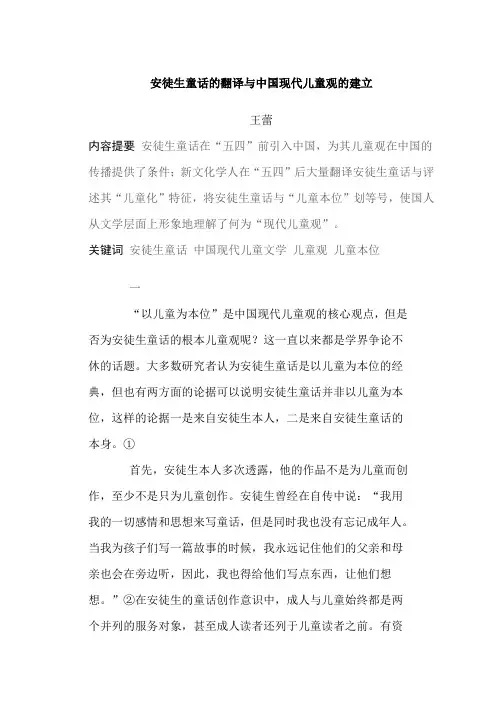
安徒生童话的翻译与中国现代儿童观的建立王蕾内容提要安徒生童话在“五四”前引入中国,为其儿童观在中国的传播提供了条件;新文化学人在“五四”后大量翻译安徒生童话与评述其“儿童化”特征,将安徒生童话与“儿童本位”划等号,使国人从文学层面上形象地理解了何为“现代儿童观”。
关键词安徒生童话中国现代儿童文学儿童观儿童本位一“以儿童为本位”是中国现代儿童观的核心观点,但是否为安徒生童话的根本儿童观呢?这一直以来都是学界争论不休的话题。
大多数研究者认为安徒生童话是以儿童为本位的经典,但也有两方面的论据可以说明安徒生童话并非以儿童为本位,这样的论据一是来自安徒生本人,二是来自安徒生童话的本身。
①首先,安徒生本人多次透露,他的作品不是为儿童而创作,至少不是只为儿童创作。
安徒生曾经在自传中说:“我用我的一切感情和思想来写童话,但是同时我也没有忘记成年人。
当我为孩子们写一篇故事的时候,我永远记住他们的父亲和母亲也会在旁边听,因此,我也得给他们写点东西,让他们想想。
”②在安徒生的童话创作意识中,成人与儿童始终都是两个并列的服务对象,甚至成人读者还列于儿童读者之前。
有资料显示,在安徒生临终前出版的最后一套童话作品上,他要求出版商抹去“献给儿童们”的字样。
安徒生并不像他的童话那样具有主动亲近儿童的意识,安徒生基金会对此的理解是:他理解儿童的思想和行为,但他绝不愿意儿童坐在他的膝上。
此外,有研究者还从安徒生童话文本的解读中,读出非儿童本位的儿童观。
首先,安徒生共创作童话作品158篇,但完全写儿童的仅28篇,而讲述成年人生活的则达64篇。
其次,许多冠以“童话”之名的安徒生童话名篇在情节设置上根本不合儿童心理,充满恐怖、悲伤与压抑。
比如,《海的女儿》小人鱼变成泡沫的悲剧结局,有研究者认为过于残酷,而且还带有明显的宗教色彩,这样的结局设计既不能让小读者理解,也让儿童感觉太伤心残忍。
再比如,《卖火柴的小女孩》中,小女孩在大雪纷飞中冻死街头的结尾,被视为过分凄惨,会让小读者的心灵受到伤害。
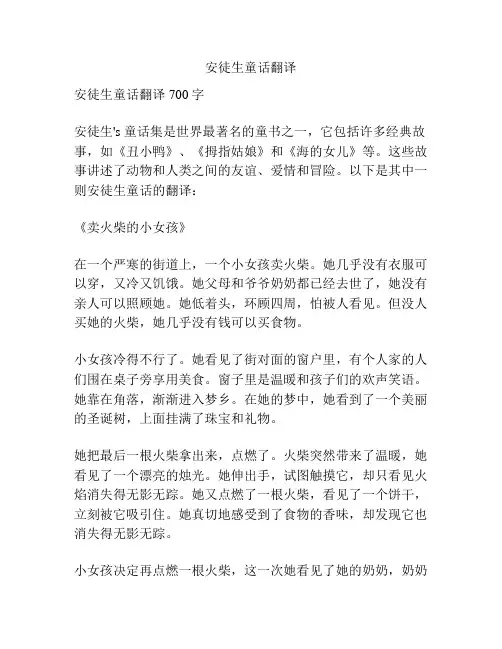
安徒生童话翻译安徒生童话翻译700字安徒生's 童话集是世界最著名的童书之一,它包括许多经典故事,如《丑小鸭》、《拇指姑娘》和《海的女儿》等。
这些故事讲述了动物和人类之间的友谊、爱情和冒险。
以下是其中一则安徒生童话的翻译:《卖火柴的小女孩》在一个严寒的街道上,一个小女孩卖火柴。
她几乎没有衣服可以穿,又冷又饥饿。
她父母和爷爷奶奶都已经去世了,她没有亲人可以照顾她。
她低着头,环顾四周,怕被人看见。
但没人买她的火柴,她几乎没有钱可以买食物。
小女孩冷得不行了。
她看见了街对面的窗户里,有个人家的人们围在桌子旁享用美食。
窗子里是温暖和孩子们的欢声笑语。
她靠在角落,渐渐进入梦乡。
在她的梦中,她看到了一个美丽的圣诞树,上面挂满了珠宝和礼物。
她把最后一根火柴拿出来,点燃了。
火柴突然带来了温暖,她看见了一个漂亮的烛光。
她伸出手,试图触摸它,却只看见火焰消失得无影无踪。
她又点燃了一根火柴,看见了一个饼干,立刻被它吸引住。
她真切地感受到了食物的香味,却发现它也消失得无影无踪。
小女孩决定再点燃一根火柴,这一次她看见了她的奶奶,奶奶带着温暖的微笑,向她走来。
小女孩快乐地伸出手,却只是抓到了寂静的黑暗。
她知道这是最后一根火柴了,但她没办法控制地又点燃了它。
这一次,她看见了一个美丽的圣诞树,上面挂满了珠宝和礼物。
她的奶奶把她抱在怀里,带她离开这个世界,去一个没有痛苦、饥饿和冷的地方。
第二天清晨,人们发现小女孩倒在街上,手里还拿着一根烧毁的火柴。
他们不知道这个小女孩已经找到了她奶奶和幸福。
他们没有意识到她曾感受过温暖和爱。

安徒生童话故事中英文对照版拉普兰女人和芬兰女人,是安徒生童话故事中的其中之一,也是我们小时候经常会看到的故事之一,不知道你是否还有记忆呢?今天小编给大家带来安徒生童话故事英文版,希望大家喜欢并且能够有所收获。
安徒生童话故事英文版(一)SIXTH STORY The Lapland Woman and the Finland Woman(One)第六个故事:拉普兰女人和芬兰女人(一)Suddenly they stopped before a little house, which looked very miserable. The roof reached to the ground; and the door was so low, that the family were obliged to creep upon their stomachs when they went in or out.他们在一个小屋子面前停下来。
这屋子是非常简陋的;它的屋顶低得几乎接触到地面;它的门是那么矮,当家里的人要走出走进的时候,就得伏在地上爬。
Nobody was at home except an old Lapland woman, who was dressing fish by the light of an oil lamp. And the Reindeer told her the whole of Gerda's history, but first of all his own; for that seemed to him of much greater importance. Gerda was so chilled that she could not speak.屋子里除了一个老太婆以外,什么人也没有,她现在在一盏油灯上煎鱼。
驯鹿把格尔达的全部经历都讲了,不过它先讲自己的,因为它觉得它的最重要。
白雪皇后(丹麦)安徒生第一个故事镜子和碎片注意!我们这就开始讲故事。
故事听到头,我们就会比现在知道更多的事情。
我们讲的是一个邪恶的地精.他是一个很坏的家伙,事实上他就是一个妖魔。
有一天他心情很好,制造了一面镜子,这面镜子有一个特点,凡是好的美的东西往里一照,就会消失得无影无踪;凡是不好的丑恶的东西放在它面前,看上去就会更加不堪入目。
在那面镜子里,美丽如画的风景好比煮栏的菠菜,最美最俏的人立时变得丑陋不堪或头足倒置,面孔完全变了形,让人无法认得出来,要是有人脸上有个雀斑,你看吧,它准会扩大开来,布满整个鼻子和嘴巴。
要是一个人心里出现虔诚善良的念头,镜于里照到的却是一副怪相,足以让妖魔对自己巧妙的发明捧腹大笑好一阵子。
妖魔开了一个地精学校,所有进过这所学校的人到处宣传,声称出现了一个奇迹,说现在人们终于能看到世界和人类的本来面目了。
他们拿着镜子到处乱跑,到后来竟找不到没有被镜子歪曲过的一片土地和一个人。
如今他们只好飞到天堂去捉弄天使了。
他们带着镜子越飞越高。
镜子也随着越笑越龇牙咧嘴。
事实上,他们都快要拿不住它。
他们飞得更高,几乎快接近太阳了,这时镜子笑得浑身发抖,令人毛骨悚然,竟从他们手中飞了出去,跌到地上,摔成了成千上万块碎片。
这下它做出了比以前更不像话的事。
因为某些碎片不比沙粒更大,它们满世界飞来飞去,—旦进入人的眼睛,便在里边落脚,于是人们看出来的东西全变得奇形怪状。
这种眼睛不看别的,专看事物坏的一面,因为任何细小的颊粒都具有整面镜子相同的魔力。
有的镜子碎片甚至进入人的心脏,后果更是令人可怕,那颗心就此变成一团冰块。
有的碎片还很大,可以用来镶嵌窗格,可你要透过这些窗格去看自己的朋友,立刻就会上当。
有些碎片被制成眼镜片,谁戴上这样的眼镜谁就倒楣。
你本来想看得清楚一点,能正确公正判断事物,那根本办不到,它们只会造成极大的混乱。
妖魔肚子都笑痛了,整个事情很合他的胃口,逗得他开心极了。
不过还有些小小的碎片飞到天上去了,现在就让我们听听它们的下落。
安徒生童话全集英文版安徒生童话全集英文版安徒生童话具有诗意的美,因其童话作品中描写现实中又具有浪漫的情怀。
》》》安徒生童话全集英文版篇一THE PRINCESS ON THE PEATHERE was once a Prince who wanted to marry a princess; but she was to be a real princess. So he travelled about , all through the world , to find a real one , but everywhere there was something in the way. There were princesses enough, but whether they were real princesses he could not quite make out : there was always something that did not seem quite right. So he came home again, and was quite sad; for he wished so much to have a real princess.One evening a terrible storm came on. It lightened and thundered, the rain streamed down; it was quite fearful! Then there was a knocking at the town-gate, and the old King went out to open it .It was a Princess who stood outside the gate . But , mercy! How she looked, from the rain and the rough weather! The water ran down her hair and her clothes; it ran in at the points of her shoes, and out at the heels; and yet she declared that she was a real princess .“Yes , we will soon find that out , ” thought the old Queen. But she said nothing, only went into the bedchamber, took all the bedding off, and put a pea on the bottom of the bedstead ; then she took twenty mattresses and laid them upon the pea, and then twenty eider-down quilts upon the mattresses . On this thePrincess had to lie all night . In the morning she was asked how she had slept .“Oh, miserably!” said the Princess. “I scarcely c losed my eyes all night long. Goodness knows what was in my bed . I lay upon something hard , so that I am black and blue all over . It is quite dreadful ! ”Now they saw that she was a real princess, for through the twenty mattresses and the twenty eider-down quilts she had felt the pea. No one but a real princess could be so tender-skinned.So the Prince took her for his wife, for now he knew that he had a true princess and the pea was put in the museum, and it is still to be seen there, unless somebody has carried it off .Look you , this is a true story .安徒生童话全集英文版篇二GREAT CLAUS AND LITTLE CLAUSTHERE lived two men in one village, and they had the same name ---- each was called Claus; but one had four horses, and the other only a single horse. T o distinguish them from each other, folks called him who had four horses Great Claus, and the one who had only a single horse Little Claus . Now we shall hear what happened to each of them, for this is a true story .The whole week through, Little Claus was obliged to plough for Great Claus, and to lend him his one horse; then Great Claus helped him out with all his four, but only once a week , and that was on Sunday . Hurrah ! How Little Claus smacked his whip over all five horses, for they were as good as his own on that one day. The sun shone gaily , and all the bells in the steeples were ringing; the people were all dressed in their best, and were going to church, with their hymn-books under their arms, to hear the clergyman preach, and they saw Little Claus ploughing with fivehorses; but he was so merry that he smacked his whip again and again, and cried, “Gee up, all my five!”“You must not talk so,” said Great Claus, “for only one horse is yours . ”But when any one passed Little Claus forgot that he was not to say this, and he cried, “Gee up, all my horses!”“Now, I must beg of you to stop that,” cried Great Claus, “for if you say it again, I shall hit your horse on the head, so that it will fall down dead, and then it will be all over with him.”“I will certainly not say it any more,” said Little Claus.But when people came by soon afterwards , and nodded “ good day ” to him , he became very glad , and thought it looked very well, after all, that he had five horses to plough his field; and so he smacked his whip again, and cried , “Gee up , all my horses ! ”“I'll ‘gee up’ your horses ! ” said Great Claus . And he took a mallet and hit the only horse of Little Claus on the head , so that it fell down , and was dead immediately .“Oh , now I haven't any horse at all !” said Little Claus, and began to cry.Then he flayed the horse , and let the hide dry in the wind, and put it in a sack and hung it over his shoulder, and went to the town to sell his horse's skin.He had a very long way to go, and was obliged to pass through a great dark wood , and the weather became dreadfully bad . He went quite astray , and before he got into the right way again it was evening, and it was too far to get home again or even to the town before nightfall.Close by the road stood a large farm-house . The shutters were closed outside the windows, but the light could still be seenshining out over them.“I may be able to get leave to stop here through the night , ” thought Little Claus ; and he went and knocked . The farmer' s wife opened the door; but when she heard what he wanted she told him to go away, declaring that her husband was not at home, and she would not receive strangers .“Then I shall have to lie outside , ” said Little Claus . And the farmer's wife shut the door in his face.Close by stood a great haystack, and between this and the farm-house was a little outhouse thatched with straw.“Up there I can lie,” said Little Claus, when he looked up at the roof , “that is a capital bed . I suppose the stork won' t fly down and bite me in the legs . ” For a living stork was standing on the roof, where he had his nest .Now Little Claus climbed up to the roof of the shed, where he lay, and turned round to settle himself comfortably . The wooden shutters did not cover the windows at the top, and he could look straight into the room. There was a great table, with the cloth laid, and wine and roast meat and a glorious fish upon it . The farmer' s wife and the parish-clerk were seated at table, and nobody besides. She was filling his glass, and he was digging his fork into the fish, for that was his favourite dish.“If one could only get some too ! ”thought Little Claus, as he stretched out his head towards the window. Heavens! What a glorious cake he saw standing there! Yes , certainly , that was a feast .Now he heard some one riding along the high road. It was the woman's husband, who was coming home. He was a good man enough, but he had the strange peculiarity that he could never bear to see a clerk . If a clerk appeared before his eyes hebecame quite wild . And that was the reason why the clerk had gone to the wife to wish her good day , because he knew that her husband was not at home ; and the good woman therefore put the best fare she had before him. But when they heard the man coming they were frightened, and the woman begged the clerk to creep into a great empty chest which stood in the comer; and he did so, for he knew the husband could not bear the sight of a clerk . The woman quickly hid all the excellent meat and wine in her baking-oven; for if the man had seen that , he would have been certain to ask what it meant .“Oh, dear!” sighed Little Claus, up in his shed, when he saw all the good fare put away .“Is there any one up there?” asked the farmer; and he looked up at Little Claus. “Why are you lying there? Better come with me into the room.”And Little Claus told him how he had lost his way, and asked leave to stay there for the night.“Yes, certainly,” said the peasant, “but first we must have something to live on .”The woman received them both in a very friendly way , spread the cloth on a long table , and gave them a great dish of porridge . The farmer was hungry , and ate with a good appetite; but Little Claus could not help thinking of the capital roast meat, fish, and cake, which he knew were in the oven. Under the table, at his feet, he had laid the sack with the horse' s hide in it ; for we know that he had come out to sell it in the town. He could not relish the porridge, so he trod upon the sack, and the dry skin inside crackled quite loudly .“Hush,” said Little Claus to his sack; but at the same time he trod on it again, so that it crackled much louder than before .“Why, what have you in your sack?” asked the farmer .“Oh, that's a magician,” answered Little Claus. “He says we are not to eat porridge, for he has conjured the oven full of roast meat , fish , and cake . ”“Wonderful!” cried the farmer; and he opened the oven in a hurry, and found all the dainty provisions which his wife had hidden there, but which, as he thought, the wizard had conjured forth. The woman dared not say anything, but put the things at once on the table; and so they both ate of the meat , the fish , and the cake . Now Little Claus again trod on his sack, and made the hide creak .“What does he say now? ” said the farmer.“He says , ” replied Claus , “ that he has conjured three bottles of wine for us, too, and that they are also standing there in the oven . ”Now the woman was obliged to bring out the wine which she had hidden, and the farmer drank it and became very merry . He would have been very glad to own such a conjuror as Little Claus had there in the sack .“Can he conjure the demon forth?” asked the farmer. “I should like to see him, for now I am merry.”“Oh, yes.” said Little Claus, “my conjuror can do any thing that I ask of him. ---- Can you not?” he added, and trod on the hide , so that it crackled . He says ‘Yes . ’ But the demon is very ugly to look at : we had better not see him.”“Oh , I' m not at all afraid . Pray ,what will he look like?”“Why, he'll look the very image of a parish-clerk . ”“Ha!” said the farmer, “ that is ugly! You must know, I can' t bear the sight of a clerk . But it doesn't matter now, for I know that he's a demon, so I shall easily stand it. Now I have courage,but he must not come too near me . ”“Now I will ask my conjuror,” said Little Claus; and he trod on the sack and held his ear down .“What does he say?”“He says you may go and open the chest that stands in the corner, and you will see the demon crouching in it; but you must hold the lid so that he doesn't slip out . ”“Will you help me to hold him?” asked the farmer. And he went to the chest where the wife had hidden the real clerk , who sat in there and was very much afraid . The farmer opened the lid a little way and peeped in underneath it .“Ugh ! ” he cried , and sprang backward . “Yes , now I've seen him, and he looked exactly like our clerk. Oh, that was dreadful ! ”Upon this they must drink . So they sat and drank until late into the night .“You must sell me that conjuror,” said the farmer. “Ask as much as you like for him. I'll give you a whole bushel of money directly . ”“No, that I can't do,” said Little Claus: “only think how much use I can make of this conjuror.”“Oh, I should so much like to have him!” cried the farmer; and he went on begging.“Well , ” said Little Claus , at last , “as you have been so kind as to give me shelter for the night , I will let it be so . You shall have the conjuror for a bushel of money; but I must have the bushel heaped up . ”“That you shall have,” replied the farmer. “But you must take the chest yonder away with you . I will not keep it in my house an hour. One cannot know ---- perhaps he may be therestill . ”Little Claus gave the farmer his sack with the dry hide in it, and got in exchange a whole bushel of money, and that heaped up . The farmer also gave him a big truck , on which to carry off his money and chest .“Farewell!” said Little Claus ; and he went off with his money and the big chest , in which the clerk was still sitting.On the other side of the wood was a great deep river. The water rushed along so rapidly that one could scarcely swim against the stream. A fine new bridge had been built over it. Little Claus stopped on the centre of the bridge, and said quite loud , so that the clerk could hear it ,“Ho, what shall I do with this stupid chest? It's as heavy as if stones were in it . I shall only get tired if I drag it any farther, so I'll throw it into the river: if it swims home to me, well and good; and if it does not, it will be no great matter .”And he took the chest with one hand, and lifted it up a little, as if he intended to throw it into the river.“No ! Stop it !” cried the clerk from within the chest; “let me out f irst !”“Ugh!” exclaimed Little Claus, pretending to be frightened, “he' s in there still ! I must make haste and throw him into the river, that he may be drowned . ”“Oh , no , no !” screamed the clerk . “I'll give you a whole bushel-full of money if you'll let me go . ”“Why, that's another thing!” said Little Claus; and he opened the chest .The clerk crept quickly out, pushed the empty chest into the water, and went to his house, where Little Claus received a whole bushel-full of money . He had already received one from thefarmer, and so now he had his truck loaded with money .“See , I've been well paid for the horse , ” he said to himself when he had got home to his own room, and was emptying all the money into a heap in the middle of the floor. “That will vex Great Claus when he hears how rich I have grown through my one horse ; but I won' t tell him about it outright . ”So he sent a boy to Great Claus to ask for a bushel measure .“What can he want with it?” thought Great Claus . And he smeared some tar underneath the measure, so that some part of whatever was measured should stick to it . And thus it happened; for when he received the measure back, there were three new three-penny pieces adhering thereto .“What's this?” cried Great Claus; and h e ran off at once to Little Claus. “Where did you get all that money from?”“Oh, that's for my horse's skin. I sold it yesterday evening. ”“That's really being well paid,” said Great Claus. And he ran home in a hurry, took an axe, and killed all his four horses; then he flayed them, and carried off their skins to the town .“Hides ! Hides ! Who'll buy any hides?” he cried through the streets .All the shoemakers and tanners came running, and asked how much he wanted for them.“A bushel of money for each !” said Great Claus .“Are you mad?” said they . “Do you think we have money by the bushel?”“Hides! Hides!” he cried again; and to all who asked him what the hides would cost he replied, “A bushel of money . ”“He wants to make fools of us,” they all exclai med. And the shoemakers took their straps, and the tanners their aprons , and they began to beat Great Claus .“Hides !Hides !” they called after him, jeeringly . “Yes , we' 11 tan your hide for you till the red broth runs down . Out of the town with him !” And Great Claus made the best haste he could , for he had never yet been thrashed as he was thrashed now .“Well,” said he when he got home, “Little Claus shall pay for this . I'll kill him for it . ”。
安徒生童话中英对照简介安徒生童话是丹麦作家汉斯·克里斯蒂安·安徒生创作的一系列儿童文学作品,被翻译成多种语言,深受全球读者喜爱。
在本文档中,我们将对部分安徒生童话故事进行中英对照,旨在帮助读者更好地理解安徒生童话的内涵和魅力。
以下是几个经典的安徒生童话故事。
小美人鱼中文版从前有一个海王子,他有六个姐姐,他们都是海里最美丽的人,可是最小的妹妹一天比一天更漂亮,他们都叫她小美人鱼。
小美人鱼有一副最迷人的声音,她的梦想就是唱给别人听。
但小美人鱼有一个很大的问题,她是个人鱼,没有人能看得到她,只有她的姐姐们知道她的存在。
于是,她决定要走到人类的世界去看看。
为了实现这个梦想,她找到了一个海巫婆,愿意为她施展魔法。
她用美丽的声音换取了一条美丽的腿,但代价是她将失去自己的声音。
小美人鱼来到了人类的世界,她在那里遇到了一个王子,王子救了她,并且爱上了她的歌声。
但遗憾的是,王子以为唱歌的是另一个人,并与另一个人结婚了。
小美人鱼非常伤心,但她并不想对王子造成任何伤害,所以她选择了自己牺牲,成为了海里的泡沫。
这是一个关于爱情和牺牲的故事,让我们感受到了小美人鱼无私的爱和奉献精神。
英文版Once upon a time, there was a prince who had six sisters, they were the most beautiful people in the sea, but the youngest sister became more and more beautiful. They all called her the little mermd. The little mermd had the most charming voice, and her dream was to sing for others.However, the little mermd had a big problem. She was a mermd and no one could see her, only her sisters knew of her existence. So, she decided to go to the human world to see it. To fulfill this dream, she found a sea witch who was willing to cast a spell for her. She exchanged her beautiful voice for a pr of beautiful legs, but the price was that she would lose her own voice.The little mermd came to the human world, where she met a prince. The prince rescued her and fell in love with her voice. Unfortunately, the prince thought that another girl was the one singing and married her. The little mermd was very sad, butshe didn’t want to hurt the prince in any way, so she chose to sacrifice herself and become foam in the sea.This is a story about love and sacrifice, which shows us the selfless love and dedication of the little mermd.卖火柴的小女孩中文版从前有一个卖火柴的小女孩,她是个穷孩子,过着很艰难的生活。
丑小鸭课文英语翻译丑小鸭课文英语翻译《丑小鸭》是丹麦作家安徒生创作的童话。
这本书写了一只天鹅蛋在鸭群中破壳后,因相貌怪异,让同类鄙弃,历经千辛万苦、重重磨难之后长成了白天鹅。
下面就是店铺整理的丑小鸭课文翻译,一起来看丑小鸭课文英语翻译一下吧。
丑小鸭故事(中文版)乡下真是美。
到了夏天!小麦是金黄的,燕麦是绿油油的。
干草在绿色的牧场上堆成垛,鹳(guàn)鸟用它又长又红的腿子在散着步,噜嗦地讲着埃及话。
(注:因为据丹麦的民间传说,鹳鸟是从埃及飞来的。
)这是它从妈妈那儿学到的一种语言。
田野和牧场的周围有些大森林,森林里有些很深的池塘。
的确,乡间是非常美丽的,太阳光正照着一幢老式的房子,它周围流着几条很深的小溪。
从墙角那儿一直到水里,全盖满了牛蒡的大叶子。
最大的叶子长得非常高,小孩子简直可以直着腰站在下面。
像在最浓密的森林里一样,这儿也是很荒凉的。
这儿有一只母鸭坐在窠里,她得把她的几个小鸭都孵出来。
不过这时她已经累坏了。
很少有客人来看她。
别的鸭子都愿意在溪流里游来游去,而不愿意跑到牛蒡下面来和她聊天。
最后,那些鸭蛋一个接着一个地崩开了。
“噼!噼!”蛋壳响起来。
蛋黄都变成了小动物。
他们把小头都伸出来。
“嘎!嘎!”母鸭说。
他们也就跟着嘎嘎地大声叫起来。
他们在绿叶子下面向四周看。
妈妈让他们尽量地东张西望,因为绿色对他们的眼睛是有好处的。
“这个世界真够大!”这些年轻的小家伙说。
的确,比起他们在蛋壳里的时候,他们的天地真是大不相同了。
“你们以为这就是整个世界!”妈妈说。
“这地方伸展到花园的另一边,一直伸展到牧师的田里去,才远呢!连我自己都没有去过!我想你们都在这儿吧?”她站起来。
“没有,我还没有把你们都生出来呢!这只顶大的蛋还躺着没有动静。
它还得躺多久呢?我真是有些烦了。
”于是她又坐下来。
“唔,情形?”一只来拜访她的老鸭子问。
“这个蛋费的时间真久!”坐着的母鸭说。
“它老是不裂开。
请你看看别的吧。
他们真是一些最逗人的小鸭儿!都像他们的爸爸——这个坏东西从来没有来看过我一次!”“让我瞧瞧这个老是不裂开的蛋吧,”这位年老的客人说,“请相信我,这是一只吐绶鸡的蛋。
安徒生童话中英文对照简短安徒生童话是世界著名的童话作品,包含许多经典故事,给人们带来了无尽的喜悦和启示。
下面是一些安徒生童话的中英文对照内容,希望能够给你带来参考。
1.《小红帽》(Little Red Riding Hood)英文:Once upon a time, there was a little girl named Little Red Riding Hood. One day, her mother asked her to take a basket of food to her sick grandmother. On the way to her grandmother's house, she met a cunning wolf who pretended to be her grandmother. The wolf ate Little Red Riding Hood and her grandmother, but later they were saved by a woodcutter.中文:从前,有一个叫小红帽的小女孩。
有一天,她妈妈让她拿一篮子食物去看望生病的奶奶。
在去奶奶家的路上,她遇到了一只狡猾的狼,它假装是她的奶奶。
狼吃了小红帽和奶奶,但后来它们被一个好心的木匠救了出来。
2.《丑小鸭》(The Ugly Duckling)英文:In a nest, there were some eggs. One of them was different from the others and everyone called it the "ugly duckling". Theugly duckling was teased by others and felt lonely and sad. Later, it realized that it was actually a beautiful swan. From then on, it lived happily with the swans.中文:在一个鸟窝里,有一些鸟蛋。
安徒生童话故事英语安徒生童话中英文对照安徒生童话故事英语安徒生童话故事英语双语安徒生童话:the Old Grave-Stone老墓碑IN a house,with a large courtyard,in aprovincial town,at that time of the year in whichpeople say the evenings are growing longer,afamily circle were gathered together at their oldhome. A lamp burned on the table,although theweather was mild and warm,and the long curtainshung down before the open windows,and withoutthe moon shone brightly in the dark-blue sky. But they were not talking of the moon,but of a large,old stone that lay below in thecourtyard not very far from the kitchen door. The maids often laid the clean copper saucepansand kitchen vessels on this stone,that they might dry in the sun,and the children werefond of playing on it. It was,in fact,an old grave-stone. “Yes,” said the master of the house,“I believe the stone came from the graveyard of theold church of the convent which was pulled down,and the pulpit,the monuments,and thegrave-stones sold. My father bought the latter;most of them were cut in two and used forpaving-stones,but that one stone was preserved whole,and laid in the courtyard.” “Any one can see that it is a grave-stone,” said the eldest of the children;“therepresentation of an hour-glass and part of the figure of an angel can still be traced,but theinscription beneath is quite worn out,excepting the name “Preben,“ and a large "S" close byit,and a little farther down the name of "Martha" can be easilyread. But nothing more,andeven that cannot be seen unless it has been raining,or when we have washed th e stone.” “Dear me! how singular. Why that must be the grave-stone of Preben Schwane and hiswife.” the old man who said this looked old enough to be the grandfather of all present in theroom. “Yes,” he continued,“these people were among the last who were buried in thechurchyard of the old convent. They were a very worthy old couple,I can remember them wellin the days of my boyhood. Every one knew them,and they were esteemed by all. They werethe oldest residents in the town,and people saidthey possessed a ton of gold,yet theywere always very plainly dressed,in the coarsest stuff,but with linen of the purestwhiteness. Preben and Martha were a fine old couple,and when they both saton the bench,at the top of the steep stone steps,in front of their house,with the branches of the linden-tree waving above them,and nodded in a gentle,friendly way to passers by,it really madeone feel quite happy. They were very good to the poor;they fed them and clothed them,andin their benevolence there was judgment as well as true Christianity. The old woman diedfirst;that day is still quite vividly before my eyes. I was a little boy,and had accompanied myfather to the old man"s house. Martha had fallen into the sleep of death just as we arrivedthere. The corpse lay in a bedroom,near to the one in which we sat,and the old man was inGREat distress and weeping like a child. He spoke to my father,and to a few neighbors whowere there,of how lonely he should feel now she was gone,and how good and true she,hisdead wife,had been during the number ofyears that they had passed through life together,and how they had become acquainted,and learnt to love each other. I was,as I have said,a boy,and only stood by and listened to what the others said;but it filled me with a strangeemotion to listen to the old man,and to watch how the color rose in his cheeks as he spokeof the days of their courtship,of how beautiful she was,and how many little tricks he hadbeen guilty of,that he might meet her. And then he talked of his wedding-day;and his eyesbrightened,and he seemed to be carried back,by his words,to that joyful time. And yetthere she was,lying in the next room,dead—an old woman,and he was an old man,speaking of the days of hope,long passed away. Ah,well,so it is;then I was but a child,and now I am old,as old as Preben Schwane then was. Time passes away,and all thingschanged. I can remember quite well the day on which she was buried,and how Old Prebenwalked close behind the coffin. “A f ew years before this time the old couple had had their grave-stone prepared,with aninscription and their names,but not the date. In the evening the stone was taken to thechurchyard,and laid on the grave. A year later it was taken up,that Old Preben might be laidby the side of his wife. They did not leave behind them wealth,they left behind them far lessthan people had believed they possessed;what there was went to families distantly related tothem,of whom,till then,no one had ever heard. The old house,with its balcony ofwickerwork,and the bench at the top of the high steps,under the lime-tree,wasconsidered,by the road-inspectors,too old and rotten to be left standing. Afterwards,when the same fate befell the convent church,and the graveyard was destroyed,the grave-stone of Preben and Martha,like everything else,was sold to whoever would buy it. And so ithappened that this stone was not cut in two as many others had been,but now lies in thecourtyard below, a scouring block for the maids,and a playground for the children. Thepaved street now passes over the resting place of Old Preben and his wife;no one thinks ofthem any more now.” And the old man who had spoken of all this shook his head mournfully,and said,“Forgotten! Ah,yes,e verything will be forgotten!” And then the conversation turned onother matters. But the youngest child in the room,a boy,with large,earnest eyes,mounted upon achair behind the window curtains,and looked out into the yard,where the moon was pouringa flood of light on the old gravestone,—the stone that had always appeared to him so dull andflat,but which lay there now like a GREat leaf out of a book of history. All that the boy hadheard of Old Preben and his wife seemed clearly defined on the stone,and as he gazed on it,and glanced at the clear,bright moon shining in the pure air,it was as if the light of God"scountenance beamed over His beautiful world. “Forgotten! Everything will be forgotten!” still echoed through the room,and in thesame moment an invisible spirit whispered to the heart of the boy,“Preserve carefully theseed that has been entrusted to thee,that it may grow and thrive. Guard it well. Throughthee,my child,shall the obliterated inscription on the old,weather-beaten grave-stone goforth to future generations in clear,golden characters. Theold pair shall again wanderthrough the streets arm-in-arm,or sit with their fresh,healthy cheeks on the bench underthe lime-tree,and smile and nod at rich and poor. The seed of this hour shall ripen in thecourse of years into a beautiful poem. The beautiful and the good are never forgotten,theylive always in story or in song.” 在一个小乡镇里,有一个人自己拥有一幢房子。